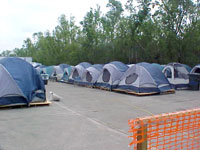Race, class divide extends to cleanup
By
Dana Gilmartin
New Orleans
Published Nov 20, 2005 11:52 PM
Contractors who have
brought in hundreds of workers to clean up flood-ravaged buildings in New
Orleans are profiting handsomely by keeping wages and expenses low.
|
After a 14-hour day, workers live
in these pup tents.
|
One
such contractor is called BMS Cat, short for BMS Catastrophe. Large groups of
workers in navy blue T-shirts or sweatshirts with “BMS CAT” on the
front can be seen in downtown New Orleans.
BMS Cat got its employees from
three labor providers that function as temporary agencies: Construct Corp.,
Command Center and—no kidding—Pot of Gold. BMS Cat and companies
like it are “storm chasers,” making profit off other people’s
tragedies.
When the cleanup began in October, many hotels and motels were
not up and running. Available rooms were at a premium. These companies made an
arrangement with Alvin Callendar Field, a naval air station with many acres to
spare across the river from downtown New Orleans. On an old runway, hundreds of
pup tents were erected on wooden pallets in closely spaced rows. The supervisors
and managers got campers and trailers. The workers were almost entirely Black
and Latin@, the managers mostly white.
At its peak this encampment held
420 people. Serving as intermediary on the base is Kellogg, Brown and Root
(KBR), the well-known military supplier and subsidiary of
Halliburton—which used to be headed by Dick Cheney, now Bush’s vice
president.
The shower facility consisted of a makeshift building with
plywood walls and Astroturf on the floor. The walls could not be properly
disinfected and the carpet harbored visible mold. There were only 10 shower
heads for men and another five for women, with knobs that only turned on and
off, rather than allowing the temperature to be adjusted. Used water flowed out
the back of the building directly onto the ground.
Ten showers for 360
men
Let’s do the math. When you subtract the supervisors and
managers, who had their own showers, and the 20 women workers, that left about
360 men. They had to shower at the end of long days of cleaning up materials
laden with bacteria and molds, and possibly contaminated with asbestos and lead.
These showers weren’t just for personal hygiene. They should be thought of
as mandatory decontamination after asbestos and lead exposure.
If each man
were allowed only a 5-min ute shower, that still would be only 120 men per
hour—or three hours for them all to shower. But their workday went from
4:30 a.m. to 6:30 p.m. So some might have to wait until 9:30 p.m. to get clean.
Late showers and early morning showers were unrealistic for workers who had to
leave the labor camp at 4:30 a.m.
The workers also suffered an inadequate
supply of portable toilets. Imagine the lines at the 15 porta-potties to urinate
in the morning. The hand-washing stations lacked hot water and anti-bacterial
soap, so crucial when a large number of people share toilets and also have been
disposing of rotting food during the workday. Workers complained there was no
time in the workday to buy personal hygiene supplies, especially since very few
drug stores had reopened.
Dirty clothes could be dropped off at the
laundry on base, to be returned in 48 hours. This sounds like a good
plan—until you realize that it required the workers to have three complete
sets of clothes with them in order not to wear contaminated clothes two days in
a row. Hand-washed underwear could be seen laid out to dry in the tent
city.
The only saving grace is that the camp is now down to 58 employees
as operations move elsewhere, including Florida. When confronted with the need
to rebuild the shower building, the project manager said he would condemn the
building and transport the workers to shower facilities elsewhere on base. He
was willing to do this only once, at 7 p.m., with no option to shower later.
This gross travesty in failing to provide sanitation for the workers is a
direct result of greed on the part of BMS Cat and lack of oversight by KBR. But
they have even more despicable ways of lining their pockets.
Fire fighters
doing security on this portion of the base stated that some workers had been
told to show up at a particular bank to get their pay. When they arrived there,
they were greeted by immigration agents who arrested undocumented workers. The
labor agency was able to simply pocket their pay.
The deplorable
conditions of the labor camp were well hidden on a large military base, with
security checkpoints controlling access. Thus do the military and the
corporations function hand in hand.
Organizers and activists need to be on
the lookout for BMS Cat and others of its ilk and expose the way they treat
workers. We can be “storm chasers” of a new kind, chasing the
companies that take on workers for cleanup after storms. They must be held
accountable for their racism and their super-exploitation of workers.
Articles copyright 1995-2012 Workers World.
Verbatim copying and distribution of this entire article is permitted in any medium without royalty provided this notice is preserved.
Workers World, 55 W. 17 St., NY, NY 10011
Email:
[email protected]
Subscribe
[email protected]
Support independent news
DONATE


